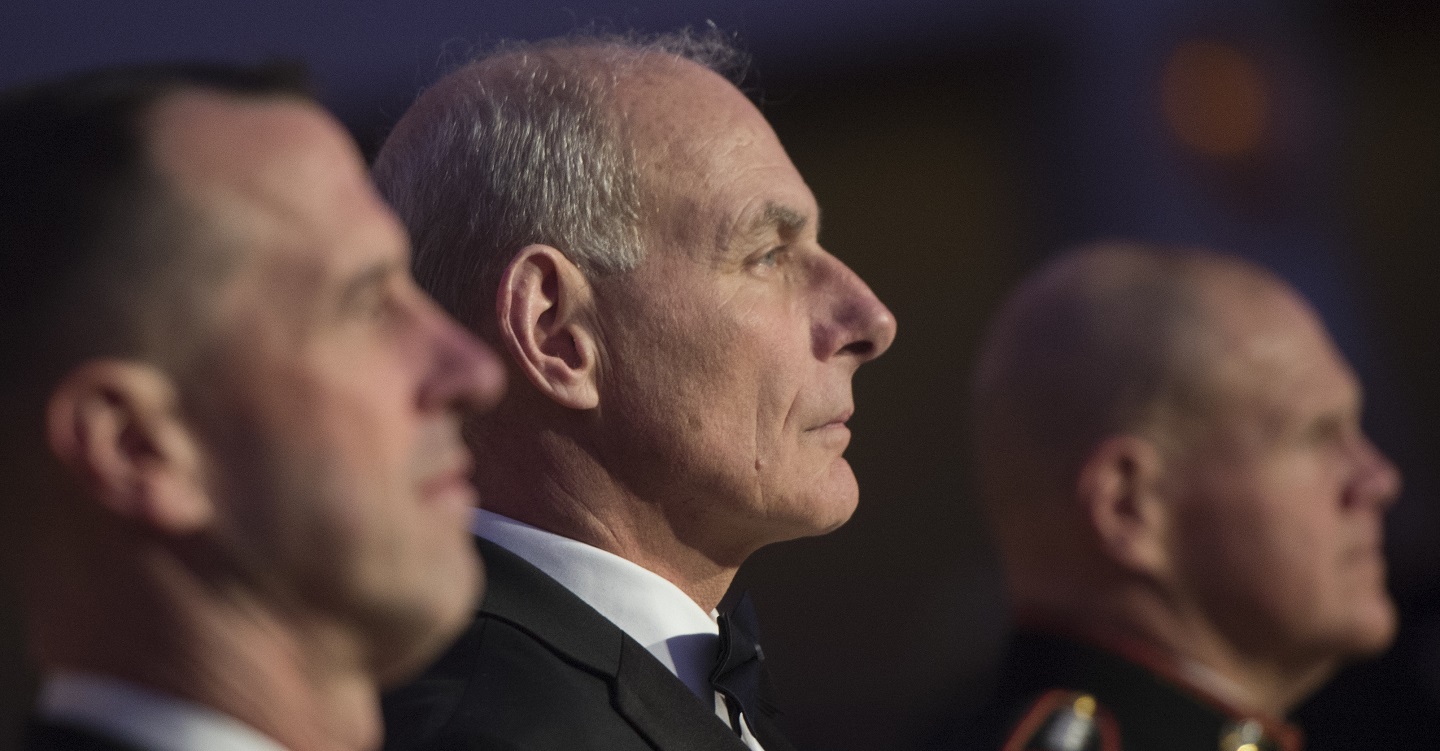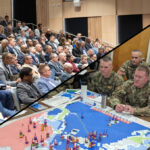
Before the events of 6 January in the nation’s capital, WAR ROOM received several submissions dealing with the topic of the military’s relationship with “politics.” It’s an extraordinarily complex discussion–from understanding, interpreting, and abiding by relevant law and regulation, to the importance of norms, and the very definition of what counts as “political” or “partisan”–none of these questions are simple. Investigations since the 6th have revealed at least one active and a number of former military members who appear to have been involved in varying degrees with the activities seen around the world on news feeds. In an attempt to further a useful discussion of the civil-military relationship WAR ROOM will publish these pieces over the next several weeks each Friday.
This third offering is by Jeff Baker. In it he examines the role of the retired senior military leader, generals and admirals, in the political sphere. Their participation in politics, even out of uniform, has long been considered taboo. Perhaps it’s time to re-look the benefits of decades of training, education and experience possessed by these skilled and seasoned leaders.
In the aftermath of the 2020 election season, some active and retired senior military officers found themselves embroiled in the election process—some by choice, and some by circumstance.
If the latest U.S. presidential election was any indication, American politics and elections are likely to remain highly polarized, contentious, and perhaps even contested affairs, and both major political parties will look for a competitive advantage. One such advantage that both sides have attempted to leverage in the past is the support of retired senior military officers. In the aftermath of the 2020 election season, some active and retired senior military officers found themselves embroiled in the election process—some by choice, and some by circumstance. As the topic of civilian and military relations is one that is not likely to fade anytime soon, the role of retired senior officers during election years deserves some in-depth discussion.
For senior military officers (namely flag officers), even the appearance of engaging in partisan activities may be newsworthy, as an ethic of nonpartisanship and remaining apolitical is a powerful professional norm, especially while officers are on active duty. Guided by both norms and regulation, the vast majority of the senior military officers on active-duty shy away from what is, or could appear to be, partisan political activity. When these norms appear to be violated or challenged, people take note. Take the example of the Chairman of the Joint Chiefs of Staff, General Mark Milley, and his role in the now-famous President Trump photo opportunity at St. John’s church near the White House during protests and General Milley’s subsequent apology. He acknowledged and apologized for the impropriety of serving military officers appearing to participate in partisan politics.
However, the decision for retired senior officers is often more complicated. In a recent article in The National Interest by Colonel Thomas E. Burke and Colonel Eric Reid, the authors suggest that retired senior military leaders should not provide endorsements for political parties or candidates in order to preserve the active-duty military’s non-partisan image. This is a widely-held view, and in addition to arguments by practitioners, the academic debate on the relationship between retired officer political endorsements and the politicization of the military is robust. But ultimately, these arguments, though well-intentioned, are wrong.
Political parties on both sides will attempt to capitalize on the reservoir of public trust the military currently enjoys. In the 2020 Presidential election, retired Lieutenant General Sean McFarland asked then former Vice President and Democratic Party nominee Joe Biden to remove a political ad that showed him walking with Biden. McFarland stated he “object[s] to the use of ANY military personnel in uniform in political ads—full stop.” Many retired senior officers echo his concern and feel any senior military leaders—even if they are retired—engaging in partisan activities risks eroding the public’s trust and violates the “ethos and professionalism of apolitical military service.” Two former Chairmen of the Joint Chiefs of Staffs, retired Navy Admiral Michael Mullen, and retired General Martin Dempsey, have stated that military leaders have an obligation to remain apolitical. However, retired Lieutenant General Michael Flynn and retired Admiral William McRaven have taken the opposite view. Flynn appeared at President Trump’s campaign events in 2016 in support of the President. Admiral McRaven penned an opinion piece in which he articulated his support of for Biden in the 2020 presidential election. Which position is the correct one? What is at stake?
One of the main reasons for the argument for retired officers to remain apolitical centers on the idea that elected officials will confuse retired senior military leaders’ opinions with active-duty senior military leaders’ advice. Senior active-duty officers understand they need to avoid partisan activity while they are on active duty. DoD Directive 1344.10 states that active-duty members of the Armed Forces should not engage in partisan political activities. The directive outlines the activities that are allowed (such as voting) and prohibited activities (such as speaking before a partisan political gathering).
Retired military officers making the leap to politics is not a new concept for America. Recent history is rife with examples of retired military making the transition to politics.
However, some scholars have suggested that there are additional consequences as well. Two respected National Security Specialist authors, David Barno and Nora Bensahel, state if military “advice comes to be seen as compromised by partisanship, the nation’s elected leaders will not be able to objectively assess their military options, and their life-and-death decisions about when and how to use force will suffer immeasurably as a result.” The flaw in the belief mentioned above suggests that elected officials are not savvy enough to distinguish between a senior retired military officer and a currently serving officer. Suggesting otherwise paints a bleak picture of the intellectual capabilities of U.S. elected officials.
Retired military officers making the leap to politics is not a new concept for America. Recent history is rife with examples of retired military making the transition to politics. In President Trump’s administration, John F. Kelly, a retired U.S. Marine general, served as the White House chief of staff as well as the Secretary of Homeland Security. Retired General Jim Mattis served as President Trump’s Secretary of Defense. Colin Powell, a retired U.S. Army General, served as U.S. Secretary of State under President George W. Bush. Retired General Alexander Meigs Haig Jr. was the U.S. Secretary of State under President Reagan as well as the White House chief of staff under presidents Nixon and Ford. Presidents Eisenhower and Grant were both retired general officers before being elected to the United States’ highest office.
Retired senior military officers have most likely been serving for over 25 years, are most likely graduates of one of the nation’s War Colleges. Senior retired officers have spent decades building knowledge and experience, which serve as invaluable assets to the American public if they so choose. If they attended the U.S. Army War College, the War College trained them in Strategic Communications, Data Analysis, Critical Thinking skills, recognizing and understanding biases, as well as a host of other abilities to make them National Security Specialists. These officers are uniquely trained to provide valuable insights to elected officials, political parties, as well as the American public.
Retired senior military officers sitting on the sidelines in perpetuity and giving up their right to voice their political opinion in order to preserve the military’s non-partisan image does a disservice to the nation. Do we really want dedicated professionals who have spent almost their entire adult life serving the United States at the highest level limiting their participation in the democratic process to only casting their votes? Or would the U.S. benefit from their experience, wisdom, and insights in politically contentious times? If those who are willing to give up their lives for democracy and their nation are no longer allowed to participate in said democracy, what does that say about the U.S. political system? It is not unreasonable to assume that those who have demonstrated fidelity to this nation might be the voice that Americans need to hear. If the call for retired senior military officers to stay silent is heeded, we run the risk of creating a warrior class where members of the warrior class are allowed to give their lives, but not their opinion.
COL Jeffrey E. Baker is an Army Officer and instructor in the Department of Command, Leadership, and Management at the U.S. Army War College. The views expressed in this article are those of the author and do not necessarily reflect those of the U.S. Army War College, the U.S. Army, or the Department of Defense.
Photo Description: Department of Homeland Security Secretary John F. Kelly, is introduced as part of the official party during the Navy-Marine Corps Ball, benefitting the Navy-Marine Corps Relief Society, at the Washington Hilton, Feb. 4, 2017. Funds provided by the Navy-Marine Corps Ball help millions of Sailors, Marines and their families with financial assistance for emergency aid, education, Combat Casualty Assistance Visiting Nurses and other vital assistance at home and abroad.
Photo Credit: DoD Photo by Navy Petty Officer 2nd Class Dominique A. Pineiro/Released
Other Articles in our Civ-Mil MiniSeries:
SHOULD THE MILITARY LEADERSHIP SPEAK UP ON PARTISAN POLITICS?





In evaluating many of the issues presented in the articles that we read today — in the War Room Blog and elsewhere — a degree of context, it would seem, might prove helpful.
(“Context: the circumstances that form the setting for an event, statement, or idea, and in terms of which it can be fully understood and assessed.” Oxford Languages.)
In this regard, let me attempt to offer some context to the matters we are discussing — not only here — but also elsewhere today. Here goes:
1. The Context Today:
“The new market-states are transforming themselves by replacing economies and cultures that were formed by the Industrial Revolution with new forms arising from the Information Revolution. The latter promotes the creation and use of knowledge, just as industrial machines enhanced the use of physical power and production.”
(See Philip Bobbitt’s “The Shield of Achilles: War, Peace and the Course of History,” with a foreword by Sir Michael Howard, in Chapter 12: “Strategy and the Market-State,” in the section therein entitled “Strategy and the Entrepreneurial Market-State: Policies.”)
As we all know, these “modern” states have also been working hard (since the end of the Cold War and much as they did back in colonial times) to also replace the economies and cultures of the even more “backward” and “primitive” states and societies of the world — for example today — certain of the states and societies of the Greater Middle East.
2. The Somewhat Similar Context Yesterday — in this case, in Andrew Jackson’s time:
“Jacksonians drew their support from Northern laborers and yeoman farmers in the South and in the West. These groups, which Jackson dubbed the ‘bone and sinew of America,’ worried that the market economy would force them into the dependent class. The Jacksonians told the farmers and the laborers that they would do everything in their power to prevent this from taking place. In essence, the men and their rank and file voting allies, along with Jackson, fought a rear-guard action against encroaching industrialization and market economy. Although they won the pivotal battles, they lost the war, because their notion of a pre-capitalist agrarian society succumbed to the industrial economy after the Civil War.”
(See the “Encyclopedia of American Political History” by Andrew Robertson, et al., and the section therein entitled “Jacksonian Democracy,” Page 194.)
As we can easily see here, “the context” (and thus the problems relating thereto both yesterday and today), these relate to:
a. The “national security” requirement to “change.” And:
b. The natural (Thucydides-like?) “honor, interest and fear” “resistance” response — which routinely emanates from those individuals and groups (importantly both here at home and there abroad) who are likely to be the “losers” in these such “change” arrangements.
Questions — Based on the “Context” Attempted Above:
Question No. 1: Can we not say that currently, traditionally and historically — in the United States, in the Western World generally and indeed elsewhere — that one of the principal and primary purposes, duties, responsibilities and uses of the military, police and intelligence forces — of both one’s own country and one’s “partner” countries as well — this is to:
a. Stand against these “resisting transformation” “losers;” this,
b. So that — and until such time as — the necessary political, economic, social and/or value “changes” — demanded by the national security requirements of one’s current time — can be achieved?
Example from today:
“a. An IDAD program integrates security force and civilian actions into a coherent, comprehensive effort. Security force actions provide a level of internal security that permits and supports growth through balanced development. This development requires change to meet the needs of vulnerable groups of people. This change may, in turn, promote unrest in the society. The strategy, therefore, includes measures to maintain conditions under which order development can take place.”
(See our Joint Publication 3-22, “Foreign Internal Defense,” dated 17 August 2018, Paragraph 2, in Chapter II, “Internal Defense and Development.”)
Question No. 2. From this perspective, can one actually say that a military person — speaking as to and/or on these matters — is acting in some “self-serving,” “partisan” or “political” manner?
Or, in sharp contrast — and specifically in consideration of the matters that I have presented here — can one not say that such a military person is, in truth, only talking about (a) their current (but importantly also their traditional and historical) “job” and (b) how they see and understand same today?
If a retired officer wants to participate in local, state, or even Federal government they should be allowed to lend their expertise, developed over decades of service, to further serve our society and the American people. However, if that officer desires to have significant influence over national political policy, they should run for office (at any level) where they then have the right and responsibility to do so!